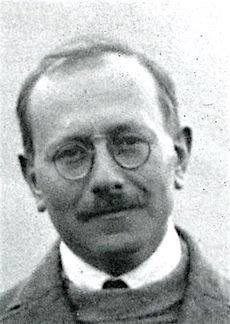Marc Bloch (1886–1944) – with the glasses – who was professor of history at the universities of Strasbourg (1931–1936), the Sorbonne (1936–1939) and Montpellier, and among the most fascinating historians of the twentieth century. He served in both world wars and even wrote a scathing political critique of the French defeat in the Battle of France in 1940, a first-hand account called L’étrange défaite (Strange Defeat) which explains why the government and ruling class were to blame. After the armistice (June 1940), Bloch returned to France, to the unoccupied southern zone where he joined the resistance at Montpellier. He was arrested by the Gestapo in March 1944, tortured and eventually shot on 16 July. This was, as Febvre says, ‘the day after the landings in Provence, when [the Nazis] were ‘emptying’ the prisons by carrying out mass killings of patriots’.
For Bloch the decisive influence, methodologically, was Lucien Febvre (1878–1956) and Febvre’s flamboyant, combative fight for a ‘new kind of history’, a ‘wider and more human history’ that was ‘total’ (‘a history impatient of compartmentalization’) & quintessentially ‘problem-oriented’ (‘No problems no history’). The two of them would meet almost every day for years together when they were at the University of Strasbourg before Febvre moved to Paris. Few historians today have any real understanding of the overwhelming sense of urgency that drove Febvre and Bloch to found Annales (“Annales d’histoire économique et sociale”) when they did (in 1929). The memory of the suicidal war of 1914–18 weighed heavily on both of them. TheAnnales ‘were not intended to serve as merely another academic quarterly…but as a new venture altogether; they were to mobilize the intelligence and the technical training of the universities for the purpose of understanding the dangerous contemporary world – and of changing it before it was too late’.
‘From January 1929 until October 1939, the Annales kept up an incessant combat against historical inevitability. From the collapse of banking systems through the rise of Fascist and Nazi regimes and until the very eve of Hitler’s war, the editors kept harnessing the best academic minds of the time to the task of “studying the present so as to reach a profounder understanding of the past”’. ‘Contributors were urged to rise above “pure erudition”, and the editors made good use of their international contacts within the informal network of socialist intellectuals to inject a sense of urgency into the pages of theAnnales. The journal was never neutral in those years; it was clearly on the Left…Every page of theAnnales bore the stamp of a global emergency’ (George Huppert, ‘Lucien Febvre and Marc Bloch: The Creation of the Annales’,The French Review, 55 (1982)).
Whereas Bloch was shot resisting the Nazis, Febvre, it is said, spent most of the war in his country-house in Franche-Comté (in eastern France), writing about religious ideas in sixteenth-century France. Febvre was a pure iconoclast and hated traditional history. Not only did he totally reject the dogma that the Reformation sprang from ‘abuses’ in church discipline, as opposed to what he himself saw as a ‘profound revolution in religious sentiment’ linked, he suggested, to ‘the needs of those men of action and businessmen who, in increasing numbers and as an ever larger class, were building a group awareness for themselves…’ (Febvre, A New Kind of History, p. 68), he even refused to believe that a ‘gap’ of any sort separated the ‘Middle Ages’ from the ‘Modern Era’. ‘The gap no longer exists’, he wrote in this seminal paper from 1929; ‘a hundred bridges as broad as avenues invite us across both ways’ (p. 59).
To Febvre, capitalism ‘in its modern form’ began at the start of the sixteenth century and was first encapsulated in the rise of Antwerp, ‘proud city of merchants and bankers’. But Febvre rejected any monolithic picture of the bourgeoisie, arguing that it was characterized by its ‘prodigious diversity’ and ‘extremely varied in its composition’. In this early paper, called ‘Capitalisme et capitalistes’ (1922), he argues, ‘there is conceivably a historical notion of “capitalism” which doesn’t map on to the economic notion of capital in any precise way; one which is more complex, more vivid as well, much less rigorous logically, but much richer in the meanings it conveys’ (Febvre, Pour une Histoire à part entière, p. 346).
by Jairus Banaji

